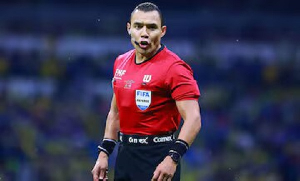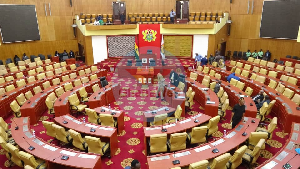A GHC88.5million judgement debt plus compound interest of 6.5% for five months is starring the government in the face and it appears the government cannot escape it.
It is made up of diverted funds plus interest.
The amount is to be paid to NDK Financial Services as a result of breach of agreement on the part of Ministry of Energy and a private contractor that executed rural electrification project for the ministry.
The Finder has learnt that by the time other aspects of the case are settled, an additional GH¢170m, which will also attract compound interest of 6.5% from July 2016 to November ending, this year, may also accrue.
Explaining the issue to The Finder, Mr Kofi Peasah-Boadu, the lawyer for NDK Financial Services, said the company had secured judgement on GH¢88.5m.
He said in 2005, government awarded contract to Ahaman Enterprise to extend electricity to some rural communities across the country.
He stated that Ahaman Enterprise approached NDK for loan to undertake the contract since the company was required to pre-finance the project.
According to him, as a pre-condition to granting the loan, Ministry of Energy issued letters of understanding guaranteeing that all cheques for the project would be written in the joint names of NDK and Ahaman Enterprise.
Mr Peasah-Boadu said the contract was executed but NDK found out that some payments, totaling GH¢88.5m, were made but not in the joint names of NDK and Ahaman Enterprise as agreed.
Consequently, in 2009, NDK went to the High Court to enforce the agreement for the money to be paid as judgement debt.
He said that at the High Court, NDK also asked the judge to order Ministry of Energy to file accounts of all payments made.
He stated the High Court ruled against Ahaman Enterprise but dismissed the case against Ministry of Energy on grounds that the letters issued by the ministry were letters of comfort and did not create enforceable contracts against government.
Not satisfied with this ruling, he said NDK appealed the judgement and in March 2013, the Appeals Court upheld NDK case that the government was held liable.
Mr Peasah-Boadu stated that the Attorney-General disagreed and went to the Supreme Court where five judges, who sat on the case, dismissed the AG’s appeal.
According to him, on November 28, 2014, the AG applied to the Supreme Court for review and two more judges were added to the panel to make it 7.
He said the 7-member Supreme Court panel dismissed the review by a majority of 6-1.
He noted that in November 2015, the AG applied for clarification of the judgement.
The AG sought clarification on whether or not jointly or severally were used in the judgement and the nature of interest payable - compound or single as well as the period for which interest was to be paid.
Mr Peasah-Boadu said on March 10, 2016, the Supreme Court clarified that the government and Ahaman Enterprise were jointly liable and the nature of interest payable was compound and should be calculated from the date of contract to the date of final notice of appeal at the Court of Appeal.
According to him, NDK was dissatisfied with the period for interest calculation and, therefore, applied to the Supreme Court for review.
He said a 7-member panel sat on the case and on June 13, 2016, the Supreme Court unanimously upheld the application of NDK.
This means a compound interest of 6.5% was to be paid from the date of contract to the date of final payment.
The lawyer for NDK said on July 4, 2016, the company filed for entry of judgement after trial which indicated that for the portion of claims that was known at the time was GH¢88.5million and will attract interest of 6.5% interest a month until the date of final payment.
He said the AG was served on July 4, 2016.
He said NDK obtained certificate of judgement on August 23, 2016 and served the AG and the Controller and Accountant General.
Mr Peasah-Boadu stated that NDK went ahead to secure garnishee order from a High Court which ordered certain accounts of government frozen and Bank of Ghana was required to appear in court to explain why monies in the affected accounts should not be used to pay the judgement debt to NDK.
He said BoG was expected to appear in court on October 13, 2016, but even before the court date was due, the AG filed a motion to set aside the certificate of judgement and this made the court to adjourn the BoG’s appearance to enable the court to hear AG’s application which was eventually dismissed.
The AG also filed a motion of stay at a High Court against the garnishee order but the court said setting aside the certificate of judgment was not executable, so the stay was also refused.
He said that the High Court explained that AG had not applied against the order of certificate of judgement and the time for doing so has elapsed and, therefore, dismissed the motion on October 31, 2016.
He stated that BoG was expected at the High Court on November 1, 2016 for garnishee processes to continue.
He said even though the adjournment was at the instance of the AG, on October 31, 2016, the AG filed notice to appear at the Court Of Appeal for stay of execution of Supreme Court judgement and certificate judgement.
The Court of Appeal, therefore, fixed yesterday November 22, 2016, but AG did not appear in Court and the case was struck out for want of prosecution.
The BoG is expected back in Court on November 30, 2016 for garnishee processes to continue.
Mr Peasah-Boadu noted that currently, there is no appeal against the Supreme Court ruling, no appeal against certificate of judgment and no appeal against garnishee order.
He said the time for appeal against all the above has elapsed.
General News of Wednesday, 23 November 2016
Source: The Finder
GHC88.5m judgement debt pops up; additional GHC170m in the waiting
Entertainment
















